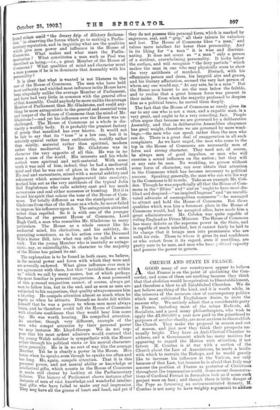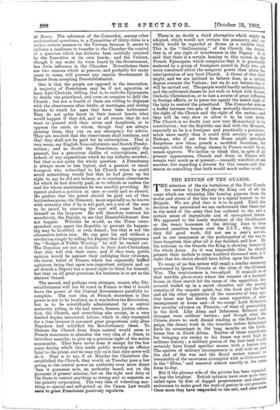CHURCH AND STATE IN FRANCE.
AGOOD many of our countrymen appear to believe that France is on the point of abolishing the Con- cordat, and some of them are exulting because they think that that abolition would be equivalent to Disestablishment, and therefore a blow to all Established Churches. We do not believe anything of the kind, and it is worth while, in the interests of the accurate view of contemporary politics which most cultivated Englishmen desire, to state the reasons why. We entirely admit that a considerable party in France, including most of the urban Radicals, all Socialists, and a good many philanthropists, who wish to apply the £1,600,000 a year now paid to the priesthood to purposes of secular charity, are most anxious to disestablish the Church. They make the proposal in season and out of season, and just now they think their prospects un- usually bright. They have an Anti-Clerical Chamber to address, and a Government which has many motives for appearing to regard the Motion with attention, if not favour. M. Combes is at war with a section of the Church about the Law of Associations, he needs a bridle with which to restrain the Bishops, and he would greatly like to increase his influence at the Vatican, not only because of that Law, but because he is afraid that Italy may assume the position of France as protector of Christians throughout the transmarine world. Some recent demonstra- tions of Cardinal Ferrari in Jerusalem look as if some such project were on foot ; and though there is little danger of the Pope so favouring an excommunicated dynasty, H. Combes is not sorry to have weighty arguments to adduce at Rome. The reference of the Concordat, among other ecclesiastical questions, to a Committee of thirty-three is a rather serious menace to the Vatican, because it seems to indicate a readiness to transfer to the Chamber the control of a question which has hitherto been carefully retained by the Executive in its own hands ; and the Vatican, though it can make its voice heard by the Government, has little influence in the Chamber. Nevertheless there are two reasons which at present, and probably for many years to come, will prevent any regular Government in France from accepting Disestablishment.
One is that the people are opposed to the innovation. A majority of Frenchmen may be, if not agnostics, at least Anti-Clericals, willing, that is, to curb the Episcopate, to deride the priesthood, and even on occasion to defy the Church ; but not a fourth of them are willing to dispense with the observances after births, at marriages, and during burials to which for ages they have been habituated. They do not quite know in their inmost hearts what would happen if they did, and at all events they do not want to quarrel with their wives and daughters, or to oppress the curds, to whom, though they are always abusing them, they run on any emergency for advice. They are resolved that the observances shall continue, and that they shall not be paid for by subscription. That is very mean, say English Nonconformists and Scotch Presby- terians ' • and no doubt the Frenchman, especially the peasant, has a penurious dislike of subscriptions, and, indeed, of any expenditure which he has hitherto avoided; but that is not quite the whole question. A Frenchman is always more or less loaical, and a peasant or small bourgeois who subscribed °to his Church when he could &void subscribing would feel that he had given up his right to say he did not believe, or to condemn observances for which he had directly paid, or to ridicule as useless the curd for whose maintenance he was steadily providing. He 'Cannot endure a position at once so costly and so absurd. He prefers that the priest should be paid out of that bottomless purse, the Treasury, more especially as he knows with certainty that if he is not paid, not a sou of the sum to be saved by starving the curd will come back to himself as the taxpayer. He will therefore instruct his mandatory, the Deputy, to see that Disestablishment does not happen. Whether he would, as the Times corre- spondent says, upset the Republic to prevent its happen- ing may be doubtful, or even denied ; but that is not the alternative before him. He can gain his end without a revolution simply by telling his Deputy that if he suppresses the " Budget of Public Worship " he will be turned out. The Deputies are not so fanatic in their Anti-Clericalism that they will risk their seats, and if they were, public opinion would be against their indulging their virulence, the latent belief of France, which has repeatedly baffled agitators, being that upon non-important subjects and on all details a Deputy has a moral right to think for himself, but that on all great questions his business is to act as the electors' funnel.
The second, and perhaps even stronger, reason why Dis- establishment will not be voted in France is that it would leave the power of the Central Government painfully in- complete. The root idea of French statesmen is that power is not to be localised, as it was before the Revolution, but is to be scientifically administered by a central authority ruling, in the last resort, finance, justice, educa- tion, the Church, and everything else except, in a very limited degree, associated labour, which is only exempted for a time because it assumed great proportions only after Napoleon had solidified the Revolutionary ideas. To liberate the Church from State control would seem to French statesmen to abandon the very idea of a State, to introduce anarchy, to give up a precious right of the entire community. They have never done it except for the few years during which they made public worship an offence fatal to the priest, and we may rely on it that they never will do it. That is to say, if on Monday the Chambers dis- established the Church, they would on Tuesday pass a law giving to the central power an authority even more direct `.han it possesses now, an authority based, not on the payment of priests' salaries, but on the right and duty of the State to control anything so strong and so separate as the priestly corporation. The very idea of tolerating any- thing so special and self-poised as the Canon Law would seem to great Frenchmen positively repulsive. There is no doubt a third alternative which might be adopted, which would not irritate the peasantry, and vet which would be regarded at Rome as a terrible blOW. This is the " Gallicanising " of the Church, the denial, that is, of any right of interference in the Papacy. It is said that there is a certain leaning to this course in the French Episcopate, which complains that it is practically enslaved by a group of foreigners seated in Italy who are more concerned about the temporal power than about the reinvigoration of any local Church. A threat of that kind might, and we are inclined to believe does, in a certain degree overawe the Vatican; but we do not believe that it will be carried out. The people would hardly understand it, and the cultivated classes do not wish to break with Roman Catholic Christendom, or to lose a source of great influence in foreign affairs, or to press too openly the naked right of the laity to control the priesthood. The Concordat acts as a buffer between two sets of ideas mutually destructive-- the right of the Church and the right of the nation—and they will be very slow to allow it to be torn down. The Church is no doubt just now very Monarchical in its constitution ; but the Republic can deal with the Monarch, especially as he is a foreigner and practically a pensioner, much more easily than it could with seventy or eighty Bishops, who if set free from Rome might introduce dangerous new ideas, preach a modified Socialism, for example, which the ruling classes in France would by no means approve. We incline to think that, in spite of all present appearances, Church and State in France will remain very much as at present,—uneasily watchful of one another, but regarding a divorce for this reason and that reason as something that both would much rather avoid.











































 Previous page
Previous page